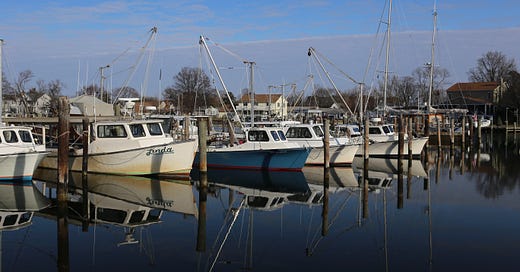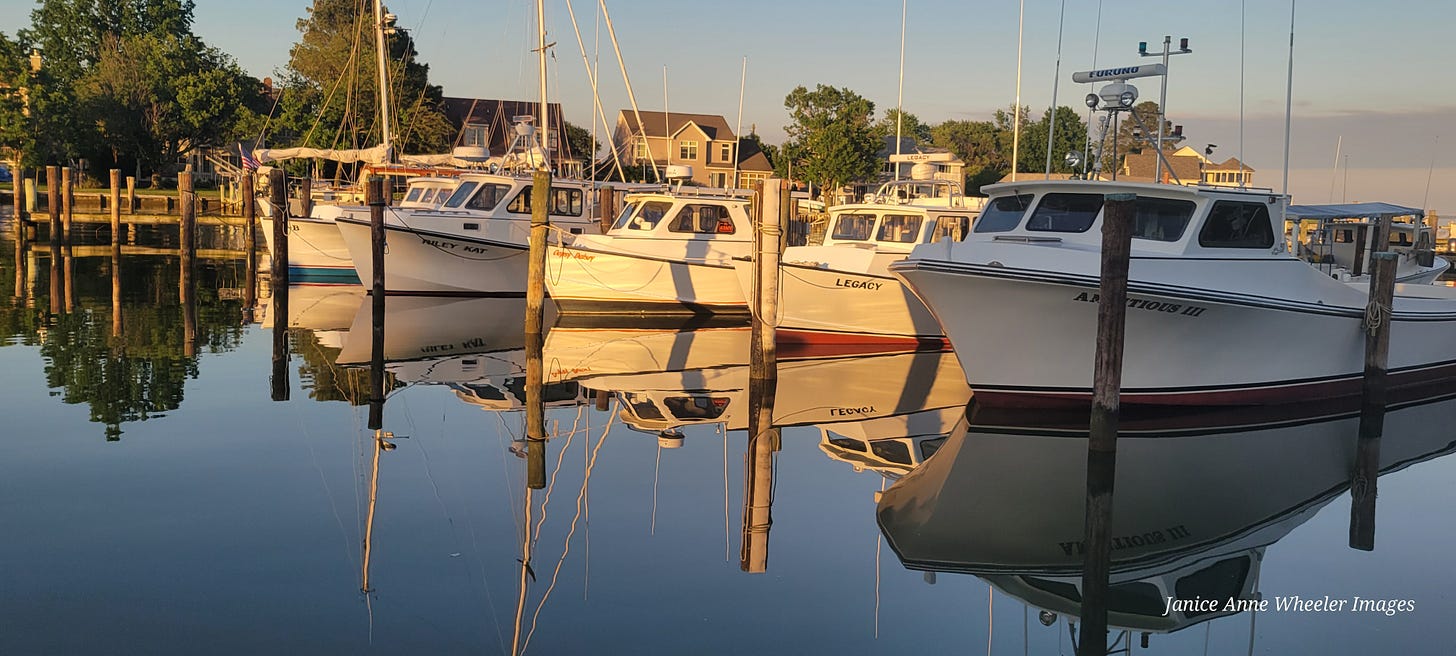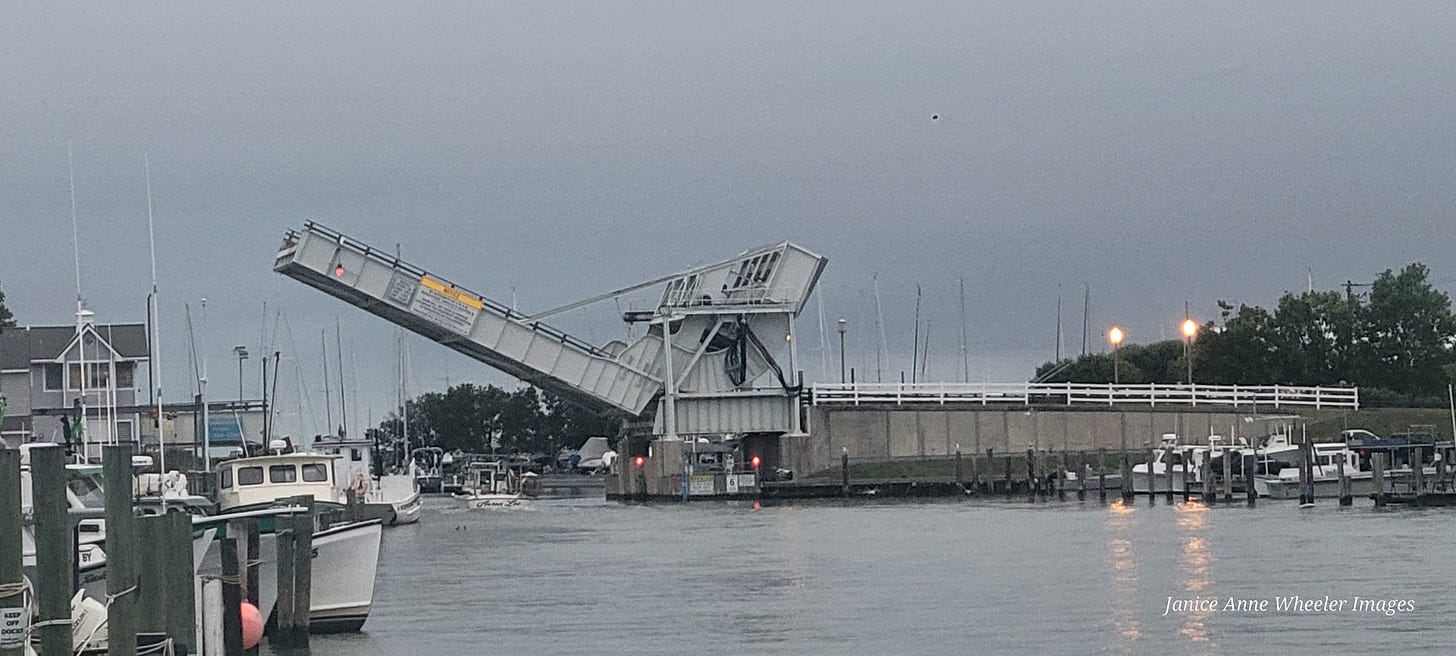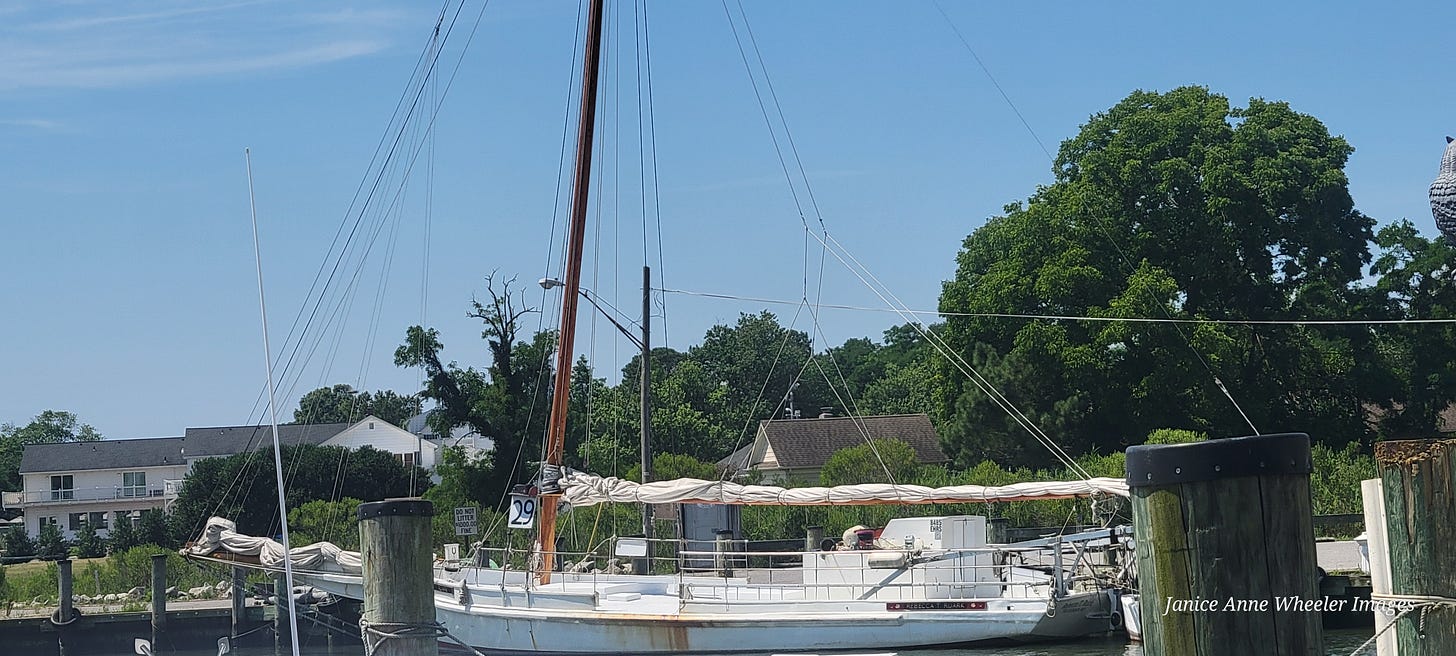Docked in our steamy summer environs, I cannot resist telling you about Tilghman Island and the legacy of the Watermen that have plied the Chesapeake Bay’s bounty for generations. STEADFAST lays at the creaking T-dock on the very channel that takes nine workboats from our yard to their hunting grounds each morning. These hardy individuals are constantly SPARRING WITH MOTHER NATURE; so this post begins a multi-part series about these hard-working people and a lifestyle that may change just enough to be jeopardized. Not by choice, but by circumstance.
The locals here have a compelling, distinctive, low-volume accent that blends words together while remaining perfectly understandable as long as you are paying attention. “I got you.” Is the best term for “yes” that I have ever heard and it is prevalent here. Tilghman is an unusual, supportive, close-knit place, a step back in time where things are simpler and people toil very long hours for uncertain pay. They rarely quit and they don’t judge.
On Saturday, from my shady pilothouse, I watched her rumble by, just as I have so many other days over the course of the last four summers, but this time the name struck a chord, and my brain started writing a story, as it does every time an opportunity presents itself that I cannot resist. I snapped some photos and the young man at the helm raised both his eyebrows and his hand in casual greeting. I smiled and went to ask permission, but he disappeared quickly at the end of his long, hot workweek.

His classic 36-foot deadrise style workboat was built by David “Bunky” Miller (God rest his soul) more as a Yacht than a workboat in 1983. Long story short, she sank and was headed for the scrap yard when the Miller family decided that was not the right thing to do. To them, she was already a piece of history, so they clearly told the owner, “No, no, no, don’t junk our legacy.” And LEGACY she became.
Bunky Miller was eighty years old when he refit LEGACY into the rugged but sleek working boat that she always should have been. But what then? The vessel had an unclear future that soon came into focus. There was a sixteen-year-old on the island that showed an impressive interest in working on the water; it was decided that youngster would rent her for one summer and then they would all go from there. Five years later, Severn Cummings is serious, committed, successful owner and docks LEGACY just four slips down from the son of the boatbuilder, another David Miller, now age 60.

“The whole story has a resurrection element,” David told me, “We wanted the traditions to continue. You know.” Severn had not yet learned all the things David’s grandfather had taught him when he was just a child, so when the summer crab season ended and oyster began, David kept Severn under his wing and taught him dredging, culling and the intricacies of making a living during the winter season around Tilghman Island. “I’ve never regretted that decision. Severn was the right choice.” he declared proudly. If taken care of, that workboat will last his entire career on the water. That’s how they’re built and we’ve learned a lot about that.
On Sunday I was on lookout again, and I caught the young Waterman at the last second as he pulled his rugged new pickup out of the dusty boatyard. I am the (nice but) eccentric sailboat lady, and played the part in full as I thudded, barefoot, wild-haired and sarong-clad, down the dock, hailing his rear-view mirror. He thankfully stepped on the brakes, rolled down the window and allowed that he didn’t think I could possibly be waving at him. He spoke quietly as I picked my way across the hundred-degree gravel, those eyebrows raised once again.
When I reached the driver’s side his expression plainly asked why on earth I would be flagging him down. “I’m a writer,” I told him (while we have greeted one another for years, it didn’t get much more personal than that). “I’ve published articles and was taking pictures of you yesterday….and I’d like to tell the story of you and your boat. The LEGACY of her.” I halted, which I don’t usually do. “That’s fine. None of that bothers me,” he told me directly. Well-adjusted, intelligent individuals meet your eyes when you speak to them, they answer quickly and honestly; they are decisive and, especially Watermen raised here, efficient. “That would be fine,” he nodded. “I’ll get in touch.”
Nothing bothers him much, I thought to myself as I turned back to the dock. Severn may just be one of those people who have the ability to take things as they come, and he’s learned some hard lessons lately, losing friends and seeing others injured beyond the imagination.
The diesels awaken me around 4am these long early summer days, and only a little later as the sun takes its journey back south. Voices carry remarkably over water, especially on calm mornings and at times I can hear rough voices over a crackling VHF radio. Sometimes I step up in the darkness and watch the silhouettes move in comfortable, longstanding routine, running lights on, readying for the day. The conversations are limited, almost non-existent, as they work toward a universal mission, to make a living and spend another day on the water, the legacy of their island. The legacy of this entire region, really. Many of the members of Severn’s generation have opted for regular hours, consistent pay and benefits: mechanics, firemen, landscapers. He did not.
I step over the predictably-placed dock lines while they are gone and the boats come back each day in a perfectly choreographed routine that varies only with the other traffic on this hundred-foot-wide slice of the Chesapeake Bay called Knapp’s Narrows. The channel separates Tilghman Island from the rest of the world; drawbridge clearance is just twelve feet. As I write this I can hear the clanging of the warning bell that indicates another raising; it’s just part of the deal here, you’re probably going to have to stop at the bridge, going one way or another. The most important thing here are the Watermen, and it doesn’t matter to those who respect them how long it takes for them to do what they do. It’s an understandable choice.
Only on Sundays do the boats stay in. The government mandates six day weeks or many of these strong people would start at 4am on that day, too; it’s not truly a day of rest, it is maintenance, refueling, baiting the trot lines, making sure that at 4am tomorrow all is well. Last fall I had the unforgettable opportunity to go out on LADY ALISON and I will always savor the memory. That story will be published soon. I wrote that one because I know this life is a heritage, a legacy, a tradition, that is disappearing; mansions are replacing farmhouses and the cost of living rises quickly as this beautiful place is ‘discovered’ by the ‘new people.’ It is a lament that will show itself as this series progresses.
For now, I’m honored to be close to these long running traditions, which began with wooden sailing vessels just like the one below that still sits at the dock down-island, one of just a few left. These Skipjack Buy Boats used to meet the smaller sailing workboats out on the water back in the day.
I hope you’re as fascinated as I am with the LEGACY of these Watermen; there are many more characters yet to be met!
If you enjoyed this, please click the little heart as that encourages others to seek out my work. As always, I read & reply to all comments and so appreciate you following along!










Lovely Janice...can almost smell the salt air tinged with fish paint and diesel. It is just so world wide as workmen of the sea practice their art with that quiet wisdom born of a legacy of lore passed down over generations. Much love from the fishing port of Whitianga NZ. ....which is sadly being taken over by tourism and commercialism like so many others. (Took your advice and enjoyed the others ) Brian
JAW, you are highly talented in weaving water stories with the wonder of appreciating and sharing your life. Thank you.